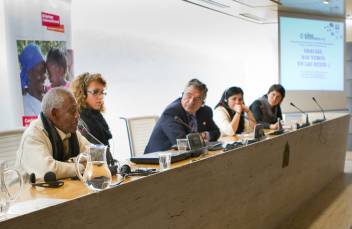 On a cold and windy Madrid day, we gathered at the Ministry of Social Services to discuss the importance and necessity of implementing a new UN convention on the rights of older people.
On a cold and windy Madrid day, we gathered at the Ministry of Social Services to discuss the importance and necessity of implementing a new UN convention on the rights of older people.
Attendees came from various countries and organisations; but all had been working in the ageing field on a national or international level for many years (or five minutes like me!). Those who were there made many valid and insightful points.
At the first round table discussion (that wasn’t really round) Louise Richardson, the Vice President of AGE Platform, began by explaining that age discrimination has multiple layers pertaining to age, gender, ethnicity, sexual orientation and many more. Discrimination has many names and faces, shapes and forms, whether is forcing people to retire, paying significantly more for insurance after a certain age or denying people the possibility of obtaining a loan.
Securing older people’s rights
To me the most interesting point she made was one I discussed with her after the discussion. The UN convention on human rights is universal, meaning it applies to all. So why do we have to keep bringing it up every time we talk about a population with any type of disadvantage?
Whether it’s about refugees, LGBT people, people with disabilities – we are constantly reminded that in practice it only applies to those who don’t need extra protection.
What I really remember from the next speaker Silvia Stefanoni, HelpAge’s interim CEO, is the concreteness of her action points. She went right to the point and asked herself (and us) what we should be doing to secure older people’s rights. Her points included:
- collecting more data, as new policies cannot be based on insufficient information,
- securing a minimal income for older people, – Lobbying for equal access to social and health security and humanitarian aid,
- raising awareness and changing existing attitudes towards ageing populations,
- ensuring that long term care happens at the community level.
In the discussion that followed three points were made, which I found refreshing. We always consider that older people who live alone do so unwillingly, when in fact some of them actually prefer it. Before we “teach” the rest of the world how to deal with these issues, we have to first figure it out ourselves. And last but definitely not least is that no retirement scheme in the world considers different types of ageing, for example biological or mental.
Role and power of civil society
We continued with Ken Bluestone (Co-Director of Global Alliance for the Rights of Older People) who emphasised the importance, role and power of civil society. To form new policies that would more adequately respond to people’s needs, we have to know what those needs are and decision makers are usually lacking in that personal experience.
On that note, he mentioned a global survey in which people would be able to contribute their own ideas about the content of the new convention on the rights of older people. Even if the project seems overly ambitious at first glance, I say there should be no other way to do it.
Unbreakable will to fight
Then we listened to Kenneth Hemley, a Jamaican Age Demands Action activist. At his age (73) he emanates an unbreakable will to fight and his story-telling was truly inspirational. I’m so glad to have met him.
I noticed how people working as volunteers in truly poor conditions have the most enthusiasm and energy to make this world a better place.
After I spoke about my experiences as a Make it Ageless campaigner, there were two more Directors of organisations, Amigos de los mayores and Cibervoluntarios. The first one focuses on bringing older people together, the other on computer literacy classes for older people. Different, but both with much needed programmes.
It was an all-around productive day; we talked and listened in turns. And to those that weren’t present I say: You missed one hell of a discussion!
Find out more about our work towards a UN convention on the rights of older people.
Sign our Age Demands Action petition in support of a convention.
